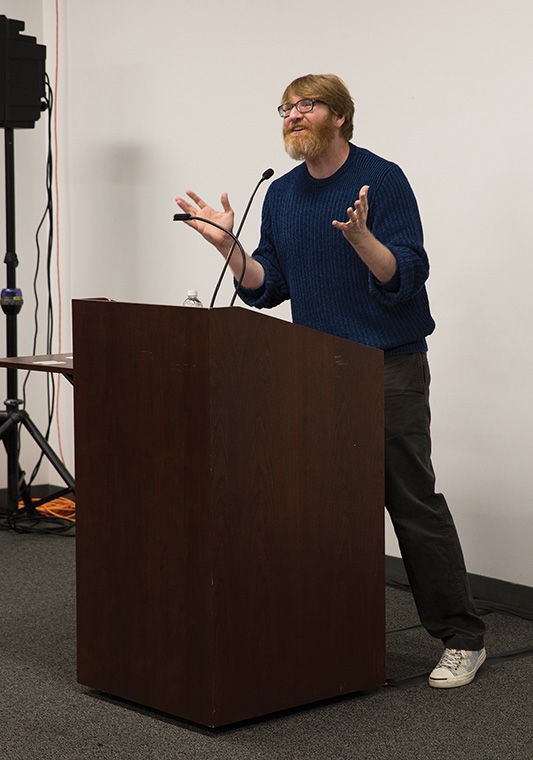Klosterman speaks candidly at Columbia
Klosterman speaks candidly at Columbia
October 27, 2014
When many aspiring writers ask a favorite author how to make it as a writer, they receive the usual answers. When famed bestselling author and magazine columnist Chuck Klosterman answers, he tells them to prepare to compromise, but stay true to their interests.
Klosterman spoke at the college’s Poetry and NonFiction Reading Series Oct. 21 to share his tips to becoming a successful writer in the age of digital books.
Known for his bestselling books, which include “Sex, Drugs, and Cocoa Puffs,” “Downtown Owl” and “Fargo Rock City,” Klosterman drew laughter from the packed audience at the 33 E. Congress Parkway Building after reading an essay from his 2005 nonfiction book, “Killing Yourself to Live.”
In addition to his published nonfiction books and novels, Klosterman has also been a prolific columnist in the sports and pop culture spheres, delivering his personal take on matters he cares about most. He has been published in GQ, Esquire, Spin, The Washington Post and The A.V. Club.
“All you can really do is write about what is personally interesting to yourself,” Klosterman said. “The things I write about are just an extension of things I am interested in. If you make yourself watch, or listen to, or read something, your experience shifts.”
The series, hosted by the Creative Writing Department’s MFA Nonfiction program, included a Q-and-A with Sam Weller, an associate professor in the Creative Writing Department, following Klosterman’s reading from “Killing Yourself To Live.” Weller and Klosterman discussed how to make it as an author in the age of digital books.
Klosterman spoke about the importance of standing up for one’s own writing and being proud of one’s own work.
“This is a crucial thing to remember for anybody here who wants to write books: You’re going to have to make some compromises with your writing,” Klosterman said. “It does not matter how many books you end up selling or what kind of reviews you get or what happens with your career. Eventually, nobody’s going to care about your book except one person—you.”
Klosterman said he knows that people generally look down on specific aspects of popular culture that are viewed as uncool or alternative, but he said it is detrimental not to talk about what you enjoy.
“‘Bad taste is good taste,’” Klosterman said, quoting one of Dave Hickey’s 1997 essays in “Air Guitar: Essays on Art & Democracy.” “‘Good taste is just the residue of someone else’s privilege.’ If you have really good taste, it means that people taught you how to be smart about art. But if you have bad taste, that means it’s yours.”
Joshua Young, associate director of Creative Writing at Columbia and a coordinator for the reading series, said speakers like Klosterman offer a different perspective on what it is like to be a professional writer because he made his own path to becoming a successful working author.
“The biggest thing is that students have access to these writers,” Young said. “Students need access to these writers to see what they’re like outside of the pages of the book. Our reading series prides ourselves on diversity of readers. We get to see people doing a bunch of different types of writing.”
Young said he was particularly excited about having Klosterman speak at the school because he gave a different and more personalized take on the craft.
“We really want our students to see these writers and their process and to be able to talk to them,” Young said. “Chuck’s kind of a rockstar, so it was really cool to get him to read and do a live Q-and-A. Our series have always been pretty big, but it’s never been that big, so it was really great to see.”
Colin Petersen, a senior journalism major, said he was particularly excited to see one of his favorite authors in person.
“I remember when I read ‘Downtown Owl’ for the first time in high school,” Petersen said. “It was the first time I was like, ‘Oh, somebody else thinks about this stuff in the way that I do.’”
Petersen said during his time in high school, when he first started reading Klosterman’s work, he could relate to somebody that thought differently from his peers.
“I love football and music, and there was really nobody else in my school that liked what I did,” Petersen said. “You either had one or the other, and I didn’t really get along with either group. Then I read [‘Downtown Owl’] and his other writings, and I realized that there was a whole series of these people like that out there.”








